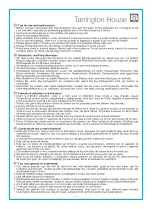
Nameplate Reorientation
The JBL nameplate on any Cabaret Series system may be
reoriented to read correctly when the enclosure is inverted
or placed horizontally. First remove the speaker grille by
loosening the screws found in the center of each snap-fit
cover fastener. Once the screws are loose, gently lift the g rille
free of the enclosure. Next, take out the screw holding the
nameplate and backing plate together, remove the nameplate
and replace it in the proper position. Note that the backing
and nameplate are keyed at 90-degree intervals, and that
the backing plate has a keying ridge which matches a groove
on the grille frame. See Figure 4. Reinstall the screw without
overtightening, and replace the grille.
Road Handles
Each Cabaret Series enclosure is equipped with flush-
mounted professional road handles. To prevent unwanted
handle vibration and noise during your performance, the han-
dles should be locked in place once initial setup is completed.
This may be done by pressing the handles firmly into the en-
closure recess.To release the handles, pull sharply outwards.
System Connection
Input to each Cabaret Series system is through the 6 m m
[}A
inch) phone jack labeled "Input" located on the recessed
terminal plate at the rear of the enclosure. A positive voltage
applied to the tip of the phone plug will cause the loudspeaker
cones to move forward. Additional loudspeaker systems can
be connected to any Cabaret system by using the 6 m m
(
1
/4 inch) phone jack labeled "External Speaker Out'.'The
systems will be wired in parallel, so care should be taken to
ensure that the total impedance is compatible with the ampli-
fier's minimum load requirements.
If the amplifier is inadvertently connected to the output jack,
and additional systems are not connected to the input jack,
the system will not operate and the amplifier will not be
terminated. This is because, unlike other systems, the loud-
speaker voice coils are shorted when no plug is inserted in
the input jack. This helps prevent speaker damage during
shipment by restricting cone movement.
Whenever plugs are not inserted, the snap covers on the
jacks will spring closed to maintain the acoustical charac-
teristics of the enclosure and to protect the interior of the
enclosure from moisture during shipment and storage.
The rear terminal plate may be removed from the enclosure
and modified for the installation of alternate connectors.
For input cable connections, 1.3 mm (16-gauge) insulated
wire is the minimum size recommended for connections up
to 15 m [50 ft). Heavier gauge wire is recommended for
greater distances; 1.6 m m [14-gauge) from 15 m (50 ft) to
30 m [100 ft) and 2 m m (12-gauge) from 30 m [100 ft) to
60 m (200 ft).
Important: When connecting or disconnecting loudspeakers
from an amplifier, the amplifier power must be turned off.
Making connections while the amplifier is operating could
seriously damage the loudspeaker system and void
the warranty.
System Adjustment
Both the 4602 Monitor and the 4680 Line Array feature
specially designed dividing networks. Crossover point for
each system is 3 kHz. For ease of adjustment both systems
provide a high frequency attenuation control that extends
through the grille. High frequency balance adjustments can
be made from the front of the system without removing the
grille from the enclosure.
To adjust the system, use a coin or a large-blade screwdriver
to turn the attenuation control. Maximum attenuation will be
obtained when the control is turned fully counterclockwise.
Figure 5. High frequency attenuation
control.
4
Figure 4. The JBL nameplate is keyed at 90 degree
intervals.
Содержание Cabaret Series
Страница 1: ...Cabaret Series Technical Manual...

























